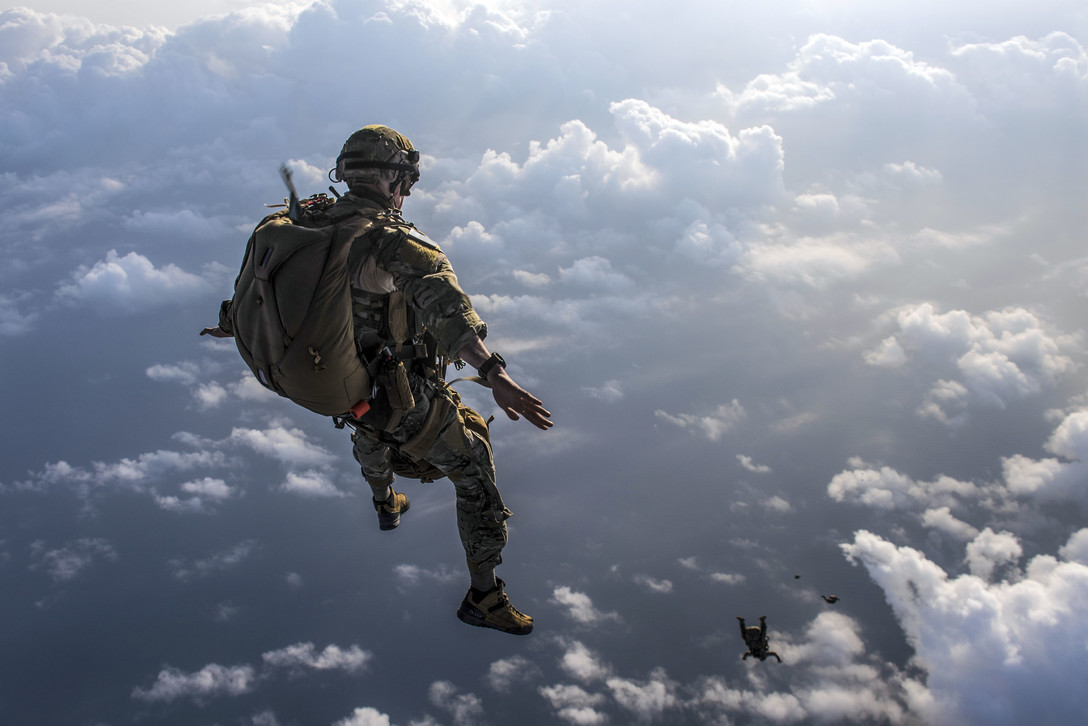
A single Soldier overlooks a vast valley in Afghanistan. Author: Sgt. 1st Class Mark Burrell. As a work of the U.S. federal government, this image is in the public domain.
This post was originally posted as part of the American Counseling Association Blog Project. Original post can be located HERE
As part of this series of articles that explores the psychological impact of a veteran’s military service that goes beyond PTSD and TBI, the concept of Learned Helplessness is a significant factor in veteran mental health. While many veterans are resilient and adaptive, often the constant barrage of negative experiences can wear down even the most hardy of service members.
As a veteran, there are few songs that speak to me as much as Bruce Springsteen’s Born in the USA. While there is a lot to be said about the great song, the meaning behind the words of the song were impactful to veterans returning from Vietnam, and have relevancy to the experience of veterans today.
The first kick I took was when I hit the ground
End up like a dog that’s been beat too much
Till you spend half your life just covering up
When I first read Martin Seligman’s Learned Optimism, both from a mental health professional’s perspective and a veteran’s perspective, these words from that song kept running through my mind…so much so that they’re written in the margin of the page where the learned helplessness experiments are being described. Farther down the page, I asked myself the question: could the constant stress of combat lead to learned helplessness – stress and burnout?
Through my experience in working with veterans struggling with transition out of combat and out of the military, I feel as though I can answer that question affirmatively.
Serving in the military is highly individualized, but it also provides those who have served with common experiences, both positive and negative. Entering into the beginning of the service…Basic Training, Recruit Training, or Boot Camp…each person is deindividualized and provided the training necessary to help them become a Soldier, Sailor, Airman, or Marine. Although there are significant amounts of aversive stimuli, such as significant strenuous physical activity, exposure to harsh conditions, restrictive discipline, and time-limited complicated tasks, the recruit soon finds that they are able to avoid this stimuli by performing the tasks appropriately and to standard. This helps to build resilience and competency.
However, as the veteran proceeds through their military service, there are times when aversive stimuli cannot be removed by any action of the service member themselves. Combat is an extreme example of that, although there are numerous examples throughout the military.
The unavoidable negative conditions can take on as many different forms as the individuals in the military themselves. I’ve met veterans who thrived in a deployed environment who struggled in a more controlled and less exciting environment when not in combat. During combat deployments, regular standards, such as pressed uniforms and spit-shined boots, are relaxed. The focus is on accomplishing the mission, whether that’s gathering intelligence, assaulting an objective, or providing security escort or overwatch duties. There are rarely formations, organized physical activity, or the structure that comes with military life on the service member’s home base. When someone returns from one highly dangerous but less restrictive environment to a less dangerous but more restrictive environment, frustration and helplessness begins to set in. A service member begins to feel “bored” and that the constant repetitiveness of garrison life is “pointless.” In order to escape these feelings, many service members turn to maladaptive but seemingly rational coping techniques, such as thrill-seeking behavior or substance use.
Another key element that is commonly experienced by military service members is the concept of “toxic leadership.” As indicated in the linked article, there are units in the military in which a service member is ruthlessly micromanaged, there is little respect shown, and there is a pervasive sense or meaninglessness and purposelessness. Unlike in the civilian workforce, military service members are unable to resign or quit to get out of an oppressive environment…you’re in the unit you are assigned to, and there’s little you can do about it. Perfect recipe for learned helplessness.
Combat itself presents an opportunity to experience more helplessness. While deployed to Iraq in 2006-2007, my base, like many in Baghdad at the time, was targeted on a near-daily basis with indirect fire attacks. Rockets and mortars would be fired at our base, a siren would go off, and everyone on the base would need to find the closest concrete bunker and wait there until the indirect fire attack was over. Consider the impact on an individual, knowing that at any time a rocket attack could begin, and there was little to do but wait. To hide, essentially, and wait until the aversive stimuli stops.
Another experience that many service members have while deployed was experiencing loss but being unable to do anything about it. I have talked to veterans who heard attacks on the radio but were unable to do anything about it. I was deployed to Afghanistan in 2010-2011, when a remote base from one of our units was under attack: Combat Outpost Keating, now known as the Battle of Kamdesh. I recall listening to the transmissions of the attack on the radio, and experiencing an overwhelming sense of frustration, and I was hundreds of miles away. There were other Soldiers who were much closer, and felt the frustration to an even greater extent. I’ve met veterans who saw an attack in the distance, but were unable to prevent it…and still wanted to.
And after leaving the service? The frustration and sense of helplessness continues. Turning once again to Springsteen’s song:
Come back home to the refinery
Hiring man said “son if it was up to me”
Went down to see my V.A. man
He said “son, don’t you understand”
Regardless of whether or not there is a sense of entitlement on the part of a returning veteran, frustration at an inability to get their basic needs met also leads to a sense of helplessness. When a veteran is unable to access basic health care, much less specialty care like mental health services, they can start to feel trapped. When a veteran is unable to find employment, regardless of the reasons, or there are challenges with housing, or they become involved in the justice system due to some of the maladaptive coping techniques described above, they could start to believe that they are, in fact, helpless.
These challenges have less to do with Posttraumatic Stress Disorder and Traumatic Brain Injury, and more to do with the veteran’s explanatory style. That’s the good news behind all of this: there is a solution. As Seligman describes in his book, he found that “helplessness could be learned, and therefore unlearned.” Further exploration into how a veteran explains their situation to themselves, whether they are the source of the aversive environment or the source is external, can lead to huge benefits. If a veteran says to themselves, “There’s no way I can get a job, because I just can’t get along with people anymore,” it’s unlikely that they will attempt to get a job with any level of confidence and enthusiasm. Once the veteran starts to understand the source of these thoughts, and learns that they have the ability to challenge them, then they realize that they do have more control over their situation than they initially thought.
If you’re a veteran, there is certainly hope beyond the feelings of hopelessness and helplessness that you may feel. If you’re a caregiver or mental health counselor, understanding the source of the veteran’s sense of futility and helplessness can help you provide the support that the veteran needs. In this way, the veteran, and their family, can achieve the stability and wellness that they both desire and deserve.




5 Comments
carl · August 4, 2018 at 5:44 pm
While many veterans are resilient and adaptive, often the constant barrage of negative experiences can wear down even the most hardy of service members. Could originate in adverse childhood experiences, ACE. Learned helplessness is one of those experiences. A childhood of negative experiences is not unlike a year of combat. The net result is trauma that needs to be identified then can be resolved.
The Challenges of Veteran Mental Health: Beyond PTSD and TBI | Head Space and Timing · January 20, 2017 at 8:55 pm
[…] In my experience, another that psychological concept that impacts veterans is the idea of Learned Helplessness, described in many areas but most clearly explained in Dr. Martin Seligman’s book, Learned Optimism. Without going into an extensive re-hashing of the concept of learned helplessness here, the condition is said to occur when someone feels powerless as a result of a traumatic event or repeated failure. Consider learned helplessness in the context of a veteran who is listening to his buddies engaging in a firefight over a radio net, but is unable to do anything about it. Or a Marine who is on perimeter guard, and sees an attack in the distance. Five miles in Afghanistan often could take an hour to navigate, but the veteran feels as though they “should” be able to “get there and do something.” After a while, the constantly reinforced idea that any action that the veteran takes will not result in the removal of the aversive stimuli will lead to learned helplessness, and ultimately depression. Then bring the veteran home, when they leave the service, and the thought is, “no matter what I do, I can’t get a job” or “nothing I do is good enough for my spouse, so why bother.” For many veterans, playing Call of Duty on the Xbox gives them a sense of accomplishment, and it’s something they’re good at…why attempt something that they’re not good at? My thoughts on Learned Helplessness can be found in this followup post. […]
Trapped in a Cage of Our Own Construction | Head Space and Timing · February 14, 2017 at 4:52 am
[…] this is true, and acting on that assumption, makes it true. This type of thinking causes us to be trapped by learned helplessness, so that even if we come across someone who will hire or help us, we assume that they […]
Here's How to Protect Yourself From Attack | Head Space and Timing · February 28, 2017 at 6:20 am
[…] veteran learns to believe that nothing they do will make a difference, so why try? A by-product of learned helplessness, this can lead to apathy and […]
Bridging the Gap Between Beautiful Lies and Ugly Truth — Head Space and Timing · July 19, 2018 at 4:52 am
[…] me. And what happens when someone is faced with an adverse situation that they can’t avoid? Learned helplessness starts to set in. Involuntary Defeat Strategy. These, in turn, lead to depression, anxiety and […]
Comments are closed.